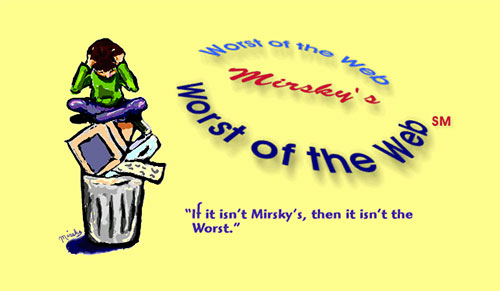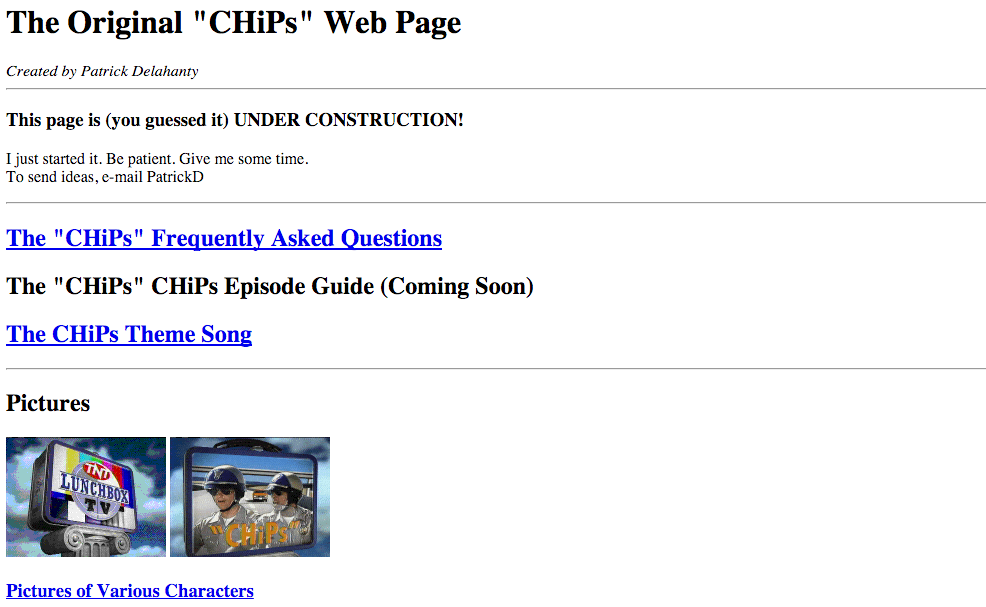Meet The Internet's First Hater
Before it became cool to dislike things online, a guy named David Mirsky was snarking heavily on Mirsky's Worst of the Web.

What the heck was Mirsky's Worst of the Web?
To put it simply, it was a site that mocked terrible things on the internet, with Mirsky (a Harvard graduate and onetime Harvard Lampoon writer who generally went by his last name) adding a short quip to each piece of content that he linked to. "Connecting to this URL scared the hell out of me. I called three doctors before finding out I was okay," Mirsky wrote on January 3, 1995—the date of the first edition of the site. The original object of his scorn is now a dead link, but the jokes remain.
Oh, about those dead links: You'll see a ton of those when looking at the 20-year-old archive of WotW (which can only be accessed via the Internet Archive—an organization you should consider donating to). It's common for sites that old to fade away, decaying like a repressed memory. But attention from Mirsky was often enough to convince users to take mocked sites down on their own.
To give you an idea of how old "20 years old" is in internet years: In the January 17, 1995 edition of WotW, he linked to a page on a Gopher server—which, if I were to do that these days, it'd be akin to writing a blog post in one of these languages or surfing the internet using Lynx on a modded Magnavox Odyssey².
In 2015, snark like the kind Mirsky created is as easy to access as a Twitter feed, but not so much in 1995. Blogs didn't even exist back then—only pre-blog journals like sci-fi writer's Jerry Pournelle's View From Chaos Manor. Usenet was a big source of snark, but Usenet was already on the decline. (Thanks, Eternal September.) WordPress creator Matthew Mullenweg, who has done more to democratize online publishing than just about anyone else, was just 10 years old when the first edition of WotW melted 9600-baud modems from New York to San Francisco.
Despite his lack of modern amenities like a CMS or social media, Mirsky could still strike two rocks together and create a comic roast. His quips were mostly tweet-length and largely follow the style and conventions of modern social media. He may have set the stage for Twitter without even realizing it. He didn't invent the internet like Al Gore—but he may have invented some of its greatest, snarkiest conventions.
From a commercial standpoint, Worst of the Web also represents one of the earliest forms of online content marketing, or using web content to pitch a business. At first, Mirsky teamed up with a web design company called Turnpike.net, running his site there before moving his web hosting elsewhere. Oddly enough, Turnpike is still online, but hasn't been updated in a number of years.
23.5k
Burning out, rather than fading away
Much like a single-serving Tumblr,WotW had both an inspiration to parody (Glenn Davis' Cool Site of the Day, which, shockingly, is still active under different ownership) and drew acolytes of its own (Vincent Flanders' Web Pages That Suck, also still active).
But by shutting down before shutting down was cool, maybe Mirsky was on to something. It's not like you go to Cool Site of the Day to find neat stuff these days, and Flanders also doesn't have quite the influence he once did.
So, when it was Mirsky's time to go, off he went. His reasons were both financial (running a popular site in 1996 wasn't bringing in the bucks) and, more importantly, creative.
"Publishing The Worst was new and fun in early 1995, but twenty-two months and over fifteen-hundred selections later, I'm no longer excited by it," he wrote in his goodbye message. "I'm feeling creatively stifled and I'm generally tired of writing about the net."
Having run (and later, shut down) a site of my own, on my own, I get that.
So where is Mirsky now?
Finding a guy who goes by his last name alone is hard. But I'm pretty sure I found him. The likeliest suspect is a guy named David Mirsky, whose claim to fame otherwise was writing for Futurama during the show's fourth season. From what I've read about Mirsky, he's still active as a Web writer, and apparently runs a freelance copywriting business these days. (I've reached out, but haven't heard back. Will let you know if I do.)
But here's where the story gets odd: Around 2000, a man named Philip Mirsky launched a column at the now-defunct culture blog NetSlaves, where he shared "open source business plans" during the peak of the dot-com bust. Every entry had a kind of large up-front ask: "Each 'open source business plan' is free for the taking as long as your first $5 million in profit is split with Mirsky," the entries stated. "By reading this paragraph, you automatically agree to these terms."
The Wall Street Journal covered his new career path at the time, and seriously questioned whether this odd clause would hold up to legal scrutiny. Really.
That's how big a deal he was back in the mid-'90s.
Before algorithms ruled
Whether someone's lying, or David's middle name is Philip (or vice-versa), or a name error got by The Journal's copy desk, the name confusion raises a slight specter of mystery about a guy who represented an era of internet where the humans leading the way were everything.
There's a reason why The Journal cared enough about a humor writer to check in on his latest hare-brained scheme. Thanks to this site he used to run, Mirsky had cultural currency for a while: He had a voice that told us things about a world that confused us at a time when the world was brand new, and he pointed out that it was okay to be weirded out by the random stuff that suddenly was flowing into our homes and offices without any filters.
We didn't have Google in 1995, remember; we had Lycos, and Lycos was no Google. This made Mirsky's value as crap-finder much more valuable than it might be now, a time when crap surfaces on your Facebook feed almost by accident. Algorithms ran our machines back then, but they didn't tell us what to read. Now, more than ever, they do.
Which is why there's something pure about what Mirsky's Worst of the Web represents. Like an old-school blues dude, a cult-classic film given a second chance thanks to basic cable, or a garage-rock band that inspired The Black Keys, this guy is begging to be re-discovered by a big audience. (Or maybe he's not. Mirsky did quit the bad-website game voluntarily, after all.)
Think about that a second: The internet is old enough that we now have obscure-but-worthy "Nuggets" akin to the kind Lenny Kaye and Jac Holzman uncovered back in 1973. That's how far we've come.
The sites Mirsky mocked
They're not easy to find.
So many of the targets of Mirsky's scorn ended up just like Worst of the Web—offline long before the days of the cloud. But a few of them—like CHiPs Online, nailed June 1, 1995 by Mirsky—are still online,wearing their badges proudly, just like Erik Estrada. A few other "worst" sites that survive, two decades later:
Xmas lists
Mitch Fincher refers to himself as "one of the lucky few" to win Mirsky's scorn on January 3, 1996, for his Christmas list. Mirsky's quip: "Well, the holidays are over. I just hope he got that stapler."
Trying too hard
Nobody likes a gloater. When 80s.com ran a campaign to become the cool site of 1996, Mirsky, right on cue, stepped in to call them the worst. His quip: "The Web is making it clearer and clearer that now is actually the 'me' decade."
Lacking in details
"What's great about the WWW is that every topic imaginable has a home page," Mirsky wrote about this page. "What's bad is that the page probably has commentary no more enlightening than this one." Ironically, it's still online—with a detailed making-of page.
When I started working on Tedium, Mirsky's work came to mind for me. That's sort of what I see this evoking—trudging the depths of the internet in an effort to find the bottom. So much of our online culture is rooted in mockery or the kind of sick-of-it-all ranting Mirsky specialized in. He showed up to the party before the room filled up, and it's like nobody even knows he was there, even though the he started the joke that everyone's been making ever since.
Maybe this little rant will convince him to stage a comeback. Even if it doesn't, the internet's very own Buster Keaton deserves a little more notice. Here's a little spotlight.
:format(jpeg)/2018/04/tedium010615--1-.gif)
/2018/04/tedium010615--1-.gif)





/uploads/ernie_crop.jpg)